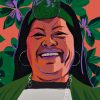Indigenous and rural women from around the world are leaders in the defense of their ancestral territories. Today, on #IWD2024, we are sharing messages from four Indigenous women defenders from three countries. Each articulates her vision for a land just future, and what must be done to ensure land rights for Indigenous women. Read more from Papiya Sharma, Funa-ay Claver, Akutui Stella Rose, and Sharda Gambit below!
Why are land rights important to you? How do you work with land rights in your community?
In our place, forest and land are important to tribal people. We women are dependent on land and forest for our food and livelihoods. We give ourselves to agriculture, but do not have land rights. So, from Swadhina, I work to help women get access to land and forest resources. We build this support so women can get kitchen gardens, get access to government schemes on land, and protect our land and agriculture from outside influence. We are campaigning for organic and traditional agricultural practices. We do this by forming local women’s groups. We call our land mother earth. To us, land and mother are the same. All women are mother, so land rights are not something anyone can give to us. It is our natural birthright. No one can protect land better than women because we give our best to our land. Papiya Sharma, Field Coordinator of Swadhina, India.
“Land rights are important to me, because Indigenous peoples are inherently tied to their ancestral lands. For people like me, in my community, we need our land to survive. In the Philippines, there is massive land grabbing happening in all of the communities. So not being able to have our ancestral land means we can’t practice our Indigenous culture, our Indigenous social practices, which can lead to the slow degradation of our own culture, our own language, our own ways of life. So a lot of the aspects of our culture are tied to our land. Losing our land to destructive projects like dams, large scale mining, destructive hydropower projects means we also lose our identity. So as someone who works closely with other Indigenous groups outside of my community, I can see that it is a common thing. It is common that these trends of destruction are happening all over the Philippines, and of course, all over Asia as well.” Funa-ay Claver, Asia Young Indigenous Peoples Network, The Philippines.
“Land is a fact of production. There is nothing you can do or achieve without using land as a fact of production. Land is important, because for us as women, because our organization focused on the rights of women, gender equality, resource rights, and natural resources generally, land rights are important because they are the basis of our existence. Land is important because it is where we grow the crops that we eat, that feed the nation, that feed our households. So if our land rights are not secure, all of the other products that come from land cannot be realized. Seventy percent of those who use land are actually women. So they use land as inheritance, as a heritage, as the backbone of life, actually. So when we talk about food security, it is women who are up front when it comes to producing food. So for us, land rights give us an assurance. It helps us, shields us from the shocks of climate change. If you don’t have land rights that are secure, it becomes difficult to exist, difficult to have development, even your household. Land rights give us an assurance of tomorrow, for generations to come. If we do not secure those land rights now, it will become difficult for the next generations to survive. So it is important for people to know about their land rights, how to protect land rights for the generations to come in the future. Let’s build your capacity, how you can protect [land rights], and help you understand what laws are there to protect land rights and what are some of the offices that you might go to in case your land rights are violated.” Akutui Stella Rose, LandNet, Uganda.
“When a woman is left alone because her husband or father dies, or if her husband leaves her, land rights is the only source of backup support for women. We go to the village head and make them aware of women’s land rights. We find that without land rights, women are unable to have a life with dignity and self respect.” Sharda Gambit, WGWLO, India.
What is unique about women’s contributions to the fight for land rights?
“In my personal experience, women are at the forefront of the Indigenous struggle here in the Phillpines. Most of the people who trained me, who I work with in the Indigenous struggle, they are women. So in terms of seeing the efforts of women, it is something I see a lot, and I think a lot of other people see it too. Not just the Indigenous peoples sector, but with the peasants and farmers sector, there is a lot of women leaders who are out at the forefront of their struggles. I think the unique thing about women’s contributions, for me here in the Philippines, is that we have practice. In the Cordillera, we have this tradition, a very very old belief, that women are the farmers. They are the ones who are supposed to plant the rice, to keep the rice fields healthy, because they are naturally life givers. They are people who can nurture. There is the belief also that the men shouldn’t be stepping into the rice fields because spiritually, emotionally, and physically, they have the chance of destroying the field. So only women are allowed, although of course, that’s an old story. But the essence of the story, the way that Indigenous communities prioritize the women, the way that they view women, not only as domestic housekeepers but also as leaders and life givers to things that can help them live, they are literally giving them life. Without the women to give them rice, the community will die. So metaphorically as well, it applies to how I view my experience right now because it really is different working with women Indigenous leaders because they are inherently compassionate towards the people they work with. So they garner a lot of strength from their intersectionality. For example, they carry the burden of being a woman, of being a marginalized sector in society. They carry these different oppressions from different sides of society, and are able to lead Indigenous communities forward. They have this strength that I believe we can only see in the women.” Funa-ay Claver, Asia Young Indigenous Peoples Network, The Philippines
“So what is unique is that the majority of people who use this land are actually women. Most of them though, their land rights are not secure, for many reasons. One of them is maybe they don’t have the knowledge to protect their rights to land. Secondly, patriarchal society dictates that it is only men who should have that power. And yet, if you look at it from this angle, the women who use the land the most are the ones who have insecure land rights. So women are very important in that they use this land, although their lands are not secure. They have always produced food to feed their families, produced food to take care of different nations and global issues in the world. So we also see that their rights are not very secure, but their voices are not very heard. When you talk about the grassroots women, different organizations are trying to empower them, to make sure that they raise their issues themselves, as opposed to us advocating for them. At LandNet, what we do, is we go deep down in the villages and try to empower women so they can occupy the platforms and spaces otherwise thought of as for the elite. Let these grassroots women come and talk about their issues, their lived experiences. So for us, as LandNet, we are trying to uplift the women, their voices, but also to encourage them to take leadership positions in land governance positions, even at the local level, so they can raise their issues as opposed to us advocating for them.” Akutui Stella Rose, LandNet, Uganda
What do you wish for women land defenders in the future?
We want to get recognized as farmers, not as farmers’ wives. We want protections in the name of land. In the tribal areas, we say water, forest, and land are the basics of our lives. Nobody can give us what is naturally ours. It is our birthright, so protecting our land is protecting our own dignity. All of us need to be aware of our right to our resources.” Papiya Sharma, Field Coordinator of Swadhina, India.
“The wish I want for Indigenous women defenders is primarily for them to be liberated. Liberation comes in many forms. It can be liberation from the aggression of development that they are experiencing within their communities. Because you cannot separate women from their identity as an Indigenous person. I wish for them, I wish for us, to be liberated from those kinds of national oppressions, systemic oppressions, that allow foreign nations to enter communities and build projects that make us evacuate even though we don’t want to. Another wish, of course, is to address the part of being a woman. Because, you know, especially in the Philippines, being born as a woman- even if you don’t have any other marginalized identity, it is a really hard thing. I believe that the liberation of women comes from root causes, like national oppression. So yeah, that’s my primary wish, liberation from national oppression. There are so many things I wish for, but none of those are possible without digging into the root cause.” Funa-ay Claver, Asia Young Indigenous Peoples Network, The Philippines.
“What I wish is for the land defenders to have an enabling environment. An environment that gives them the opportunity to do their work without intimidation. I want a workable environment, an environment that enhances the work that they do.” Akutui Stella Rose, LandNet, Uganda.
Share the voices of these powerful women leaders with the world by following us on Twitter and Instagram.



